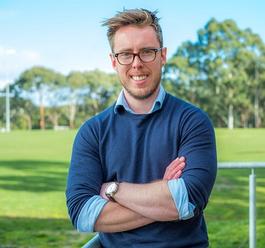
People living with and beyond cancer often face a range of health challenges, such as physical weakness, fatigue, pain, altered body image, and mental health concerns. These difficulties can result in reduced physical function, disrupted sleep, nutritional concerns, and changes in cognition.
Exercise is increasingly becoming recognised as a powerful intervention for people living with and recovering from cancer. Australia is at the forefront of research into understanding how exercise positively impacts people living with and beyond cancer. Evidence shows significant improvements in physical function, cancer-related fatigue and overall quality of life.
In response, a team of experts from Flinders University, including Dr Matthew Wallen, Dr Holly Evans, Mr Nathan Chesterfield, Dr Joyce Ramos, and Professor Claire Drummond, have introduced the ‘Cancer Exercise and Physical Activity Service,’ a new student-led initiative. This service draws from the extensive clinical experience and research conducted by Dr Evans and Dr Wallen. Dr Evans’ research investigated the use of digital methods to assist men with metastatic cancer in sticking to exercise routines, while Dr Wallen’s research in measuring physical capacity before cancer treatment and the use of exercise to enhance individuals’ physical state before treatment; a practice known as ‘prehabilitation’.

“It was identified that student-led exercise services could be a key facilitator of improving engagement for people living with and beyond cancer,” Dr Matt Wallen explained.
The Cancer Exercise and Physical Activity Service adopts a new approach to meet the increasing need for cost-effective and accessible services to support patients during and after treatment. Hosted at Flinders University, this 12-week exercise program offers group-based sessions through Flinders’ Health2Go service and provides individualised home-based exercise programs that clients can complete throughout the week.
At the same time as the initiative delivers evidence-based exercise interventions to improve cancer patients’ health and wellbeing, it also serves as a learning platform for 5th-year postgraduate Clinical Exercise Physiology students. These students gain a unique opportunity to learn directly from highly skilled healthcare professionals in a clinical environment.
Designed as the first step toward a new care framework for exercise-related oncology services, the ‘Cancer Exercise and Physical Activity Service’ aims to shift from conventional hospital-based settings to community-centred care, encouraging self-management. Dr Wallen is hopeful the project will establish a precedent for student-led models in cancer care, stating,
“We hope that this project will foster new and exciting collaborations into the future and provide the foundation for other innovative and student-led models of care in the cancer setting.”
This service strongly aligns with the objectives of the Caring Futures Institute, in particular the Cancer Survivorship Program through building and sustaining innovative research, creating a community that promotes diversity in solutions and communities, and enhancing impact through local multidisciplinary relationships.
Through collaborative partnerships with the Flinders Foundation and Flinders Medical Centre, the project’s impact will extend beyond its current participants.
“The long-term goal of the Cancer Exercise and Physical Activity Service is to establish a sustainable, student-led care model that equips graduates for the workforce and enhances accessibility to exercise services for all individuals, thus improving cancer care for people living with cancer and beyond,” Dr Wallen said.

